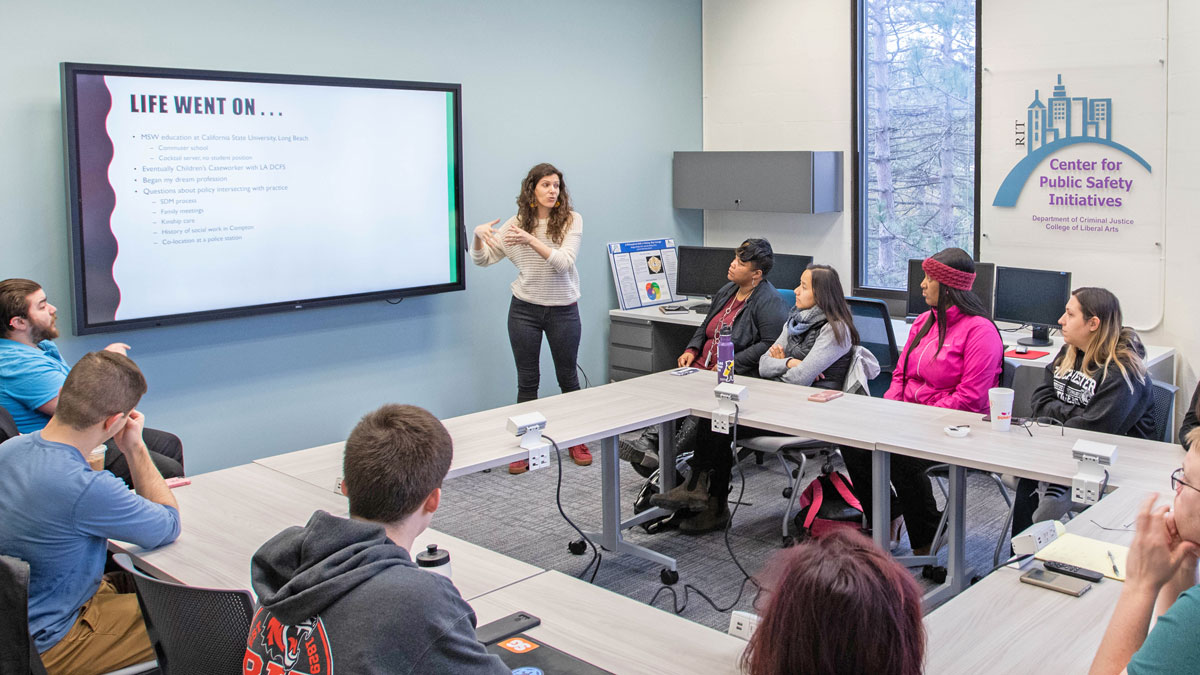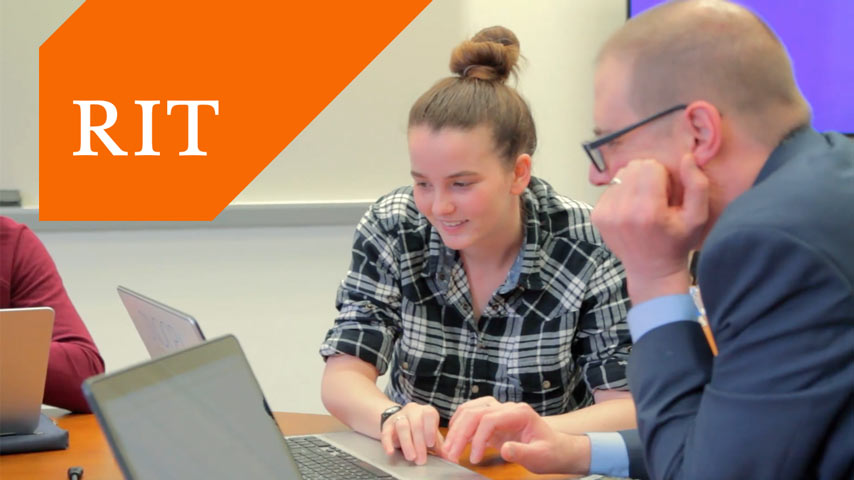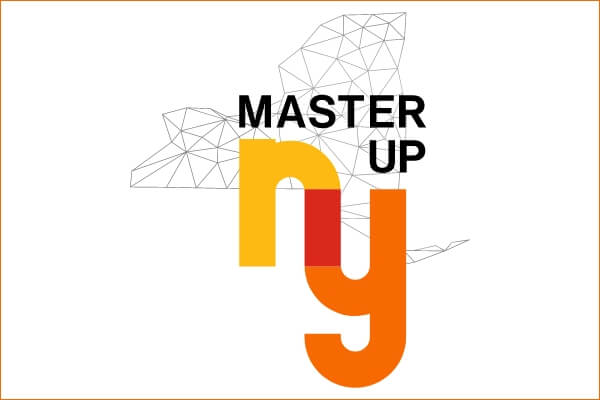Criminal Justice Master of Science Degree

Criminal Justice
Master of Science Degree
- RIT /
- College of Liberal Arts /
- Academics /
- Criminal Justice MS
RIT’s master’s in criminal justice, is a dynamic degree where you’ll develop problem-solving and critical thinking skills as you engage in applied research that contributes to the creation and dissemination of criminal justice knowledge and policy analysis.
Overview for Criminal Justice MS
Why Pursue an MS in Criminal Justice at RIT?
Multidisciplinary Approach: RIT's MS in criminal justice emphasizes the study of urban issues, public safety, and training in policy analysis and practice.
Career Readiness: Recent graduates have entered careers in prosecutorial investigation, criminal justice program evaluation, and crime analysis.
Preparation for Advanced Study: Students are well-prepared to pursue law degrees and doctoral degrees if they should choose to do so.
RIT’s criminal justice master’s degree fosters the creation of new knowledge through active research in agencies and the community. You will learn and apply problem-solving skills rooted in areas of individual interest with an emphasis on applied research. The master's of criminal justice enables graduates to enter successful careers in criminal justice agencies, policy analysis, or pursue further education in a criminal justice doctoral program.
The MS in criminal justice emphasizes a multidisciplinary approach to urban studies with a focus on public safety. The program stresses training in policy analysis and practice, particularly as it is relevant to the community and urban issues.
The master’s degree in criminal justice builds on a foundation of locally relevant policy research by providing you with the critical skills to carry out such work and the experience to assure success in employment or pursuit of further graduate studies. RIT’s criminal justice master's program provides you with a strong foundation in criminological, criminal justice theory, and social science research skills, enabling you to have a successful career in the policy analysis arena or to be prepared to pursue advanced study beyond the master's degree.
Recent graduates with a criminal justice master's degree have entered careers in prosecutorial investigation, criminal justice program evaluation, and crime analysis. Many have also pursued law degrees and doctoral degrees.
Students applying to the program should have a strong undergraduate foundation in criminology and research methods. Students who do not possess these skills may be required to complete additional undergraduate coursework (e.g., Criminology, Theories of Crime, and Research Methods) or demonstrate equivalent skills for completion of the degree.
-
Join us for Fall 2025
Many programs accept applications on a rolling, space-available basis.
-
Next Steps to Enroll
Accept your offer of admission and take the next steps toward becoming an RIT Tiger.
-
30% Tuition Scholarship for NY Residents and Graduates
Now is the perfect time to earn your Master’s degree. If you’re a New York state resident with a bachelor’s degree or have/will graduate from a college or university in New York state, you are eligible to receive a 30% tuition scholarship.
Careers and Experiential Learning
Typical Job Titles
| Crime Data Analyst | Policy Analyst | Grant Manager/Writer |
| Lawyer | FBI Operational Support Technician | FBI Staff Operations Specialist |
| Advocacy Specialist |
Cooperative Education and Internships
What makes an RIT education exceptional? It’s the ability to complete relevant, hands-on career experience. At the graduate level, and paired with an advanced degree, cooperative education and internships give you the unparalleled credentials that truly set you apart. Learn more about graduate co-op and how it provides you with the career experience employers look for in their next top hires.
Co-ops and internships take your knowledge and turn it into know-how. A liberal arts co-op provides hands-on experience that enables you to apply your knowledge in professional settings while you make valuable connections between course work and real-world applications.
Cooperative education is strongly encouraged for graduate students in the criminal justice master’s degree.
Featured Work and Profiles
-
Jane Research Fellowship Supports Crime Data Research with Powerful Impact for Rochester Region
Hayder Alhafedhi In the fight against a range of crimes from common theft to violent aggravated assault or murder, how do law enforcement agencies determine where to focus their resources for the most impact? Once a...
Read More about Jane Research Fellowship Supports Crime Data Research with Powerful Impact for Rochester Region -
RIT Alumna Thrives in Real Estate Law at Prestigious NYC Firm
After passing the New York state bar exam, Shakierah Smith became a real estate associate at Fried, Frank, Harris, Shriver & Jacobson, a law firm in New York known nationally for its...
Read More about RIT Alumna Thrives in Real Estate Law at Prestigious NYC Firm -
Spatial Data Analytics three-course electives sequence — entirely online
Offered entirely online, a new Spatial Data Analytics three-course electives sequence helps MS students build a critical skill set for today's criminal justice researchers.
Read More about Spatial Data Analytics three-course electives sequence — entirely online -
Empowering Change Through Research
Libnah Rodriguez, a dedicated research associate at RIT's Center for Public Safety Initiatives, combines her academic achievements in criminal justice with community-driven projects to tackle pressing...
Read More about Empowering Change Through Research -
Shakierah Shayonna Smith
“My greatest accomplishment is becoming a licensed attorney in New York State. As a first-generation student, I was naïve about the process of becoming an attorney…But I did all of this on my first...
Read More about Shakierah Shayonna Smith -
“I am so lucky to have the greatest mentors and peers.”
— Venita D’Angelo, criminal justice BS '23, Center for Public Safety Initiatives Research Assistant
Read More about “I am so lucky to have the greatest mentors and peers.”
Curriculum for 2024-2025 for Criminal Justice MS
Current Students: See Curriculum Requirements
Criminal Justice (thesis option), MS degree, typical course sequence
| Course | Sem. Cr. Hrs. | |
|---|---|---|
| First Year | ||
| CRIM-700 | Pro-Seminar In Criminal Justice Theory |
3 |
In this pro-seminar, students examine the theoretical foundation of criminal justice. This course integrates studies of criminal justice systems, enforcement organizations, judicial decision-making, courtroom communities and correctional systems by focusing on the study of governmental social control premised on punishment or blameworthiness. It examines the underlying causes and patterns of official responses to behavior that may be labeled criminal, and the structures, policies, and practices of criminal justice. (CRIM-MS) Seminar (Fall). | ||
| CRIM-701 | Statistics |
3 |
The purpose of this course is to provide students with training in quantitative analysis of social science data. Students will develop a conceptual understanding of techniques, the ability to recognize the appropriate selection of techniques, and the ability to use those statistical measures and interpret their results. Students will gain experience with inferential statistics through the level of commonly used multivariate analyses. The prerequisite for this course will be a strong undergraduate foundation in statistical analysis. With the consent of their adviser and the graduate coordinator, qualified students may substitute more specialized statistics courses or courses in such areas as geographical information systems (GIS). (CRIM-MS) Seminar (Fall). | ||
| CRIM-702 | Pro-Seminar in Research Methods |
3 |
This seminar will focus on the principles and techniques of research with a special focus on evaluation research. The course will cover research conceptualization and design, development of appropriate measures, collection and analysis of data using a wide range of methods. Students will gain a thorough understanding of the research process as well as the policy implications and consequences of research and evaluation. Students will also begin to develop a thesis research proposal. (CRIM-MS) Seminar (Fall). | ||
| CRIM-703 | Advanced Criminology |
3 |
This course will provide students with a detailed understanding of the theories that have guided criminological research and policy. Subject matter will cover the major influences in criminology: the classical school, the Chicago School, strain theories, socialization, and learning theories, and conflict theories, among others. The prerequisite for this course will be a strong undergraduate foundation in theories of crime and criminality. (CRIM-MS) Seminar (Spring). | ||
| CRIM-704 | Crime, Justice and Community |
3 |
This course provides an overview of the role of communities in crime and criminal justice. The course begins by preparing a foundation in community theory. Students will gain an understanding of the critical dimensions and attributes which define community. The course will emphasize how these critical community dimensions are related to both crime and criminal justice. The course will involve an examination of community-based theory and research, with a special emphasis on the criminology of place and how crime and justice patterns are embedded in particular social structures and cultures. We will discuss the extent to which structural characteristics (e.g., poverty, residential mobility, etc.) and social processes (e.g., social capital, collective efficacy, etc.) are related to crime and disorder. The course will also examine the potential that exists within criminal justice to intervene in communities to reduce crime and disorder and build community in the process. Central to this will be a discussion of co-production (i.e., the intersection between formal and informal social control). (CRIM-MS) Seminar (Spring). | ||
| CRIM-705 | Interventions and Change in Criminal Justice |
3 |
This course will focus on theory and research regarding the effectiveness of broad anti-crime strategies and specific intervention efforts at the local, state, national and international level. Theoretical explanations of crime and ideological orientations towards crime will be linked with the crime control and prevention strategies associated with those perspectives. Each strategy of crime control/prevention (including deterrence, incapacitation, rehabilitation, and community crime prevention) will be assessed in terms of research findings on its effectiveness. Detailed attention will be given to prevention/control strategies aimed at both juvenile and adult offenders. Programs will also be examined in the broader context of the ideology and philosophy of justice. Students will become familiar with the state of the art in crime and justice related interventions by studying the theory, practice and evaluation of contemporary crime and justice interventions. (CRIM-MS) Seminar (Spring). | ||
Electives |
6 | |
| Second Year | ||
| CRIM-800 | Thesis in Criminal Justice |
6 |
The master's thesis in criminal justice involves independent research on an approved topic judged by a faculty committee and under the supervision of one faculty member. The thesis requires students to develop, design and complete an original research project; orally defend the thesis before the thesis committee and the public; and submit a bound copy to the library. Students will meet weekly with their thesis chair. (Prerequisites: CRIM-700 and CRIM-701 and CRIM-702 and CRIM-703 and CRIM-704 and CRIM-705 or equivalent courses.) Thesis (Fall, Spring, Summer). | ||
| Total Semester Credit Hours | 30 |
|
Criminal Justice (project option), MS degree, typical course sequence
| Course | Sem. Cr. Hrs. | |
|---|---|---|
| First Year | ||
| CRIM-700 | Pro-Seminar In Criminal Justice Theory |
3 |
In this pro-seminar, students examine the theoretical foundation of criminal justice. This course integrates studies of criminal justice systems, enforcement organizations, judicial decision-making, courtroom communities and correctional systems by focusing on the study of governmental social control premised on punishment or blameworthiness. It examines the underlying causes and patterns of official responses to behavior that may be labeled criminal, and the structures, policies, and practices of criminal justice. (CRIM-MS) Seminar (Fall). | ||
| CRIM-701 | Statistics |
3 |
The purpose of this course is to provide students with training in quantitative analysis of social science data. Students will develop a conceptual understanding of techniques, the ability to recognize the appropriate selection of techniques, and the ability to use those statistical measures and interpret their results. Students will gain experience with inferential statistics through the level of commonly used multivariate analyses. The prerequisite for this course will be a strong undergraduate foundation in statistical analysis. With the consent of their adviser and the graduate coordinator, qualified students may substitute more specialized statistics courses or courses in such areas as geographical information systems (GIS). (CRIM-MS) Seminar (Fall). | ||
| CRIM-702 | Pro-Seminar in Research Methods |
3 |
This seminar will focus on the principles and techniques of research with a special focus on evaluation research. The course will cover research conceptualization and design, development of appropriate measures, collection and analysis of data using a wide range of methods. Students will gain a thorough understanding of the research process as well as the policy implications and consequences of research and evaluation. Students will also begin to develop a thesis research proposal. (CRIM-MS) Seminar (Fall). | ||
| CRIM-703 | Advanced Criminology |
3 |
This course will provide students with a detailed understanding of the theories that have guided criminological research and policy. Subject matter will cover the major influences in criminology: the classical school, the Chicago School, strain theories, socialization, and learning theories, and conflict theories, among others. The prerequisite for this course will be a strong undergraduate foundation in theories of crime and criminality. (CRIM-MS) Seminar (Spring). | ||
| CRIM-704 | Crime, Justice, and Community |
3 |
This course provides an overview of the role of communities in crime and criminal justice. The course begins by preparing a foundation in community theory. Students will gain an understanding of the critical dimensions and attributes which define community. The course will emphasize how these critical community dimensions are related to both crime and criminal justice. The course will involve an examination of community-based theory and research, with a special emphasis on the criminology of place and how crime and justice patterns are embedded in particular social structures and cultures. We will discuss the extent to which structural characteristics (e.g., poverty, residential mobility, etc.) and social processes (e.g., social capital, collective efficacy, etc.) are related to crime and disorder. The course will also examine the potential that exists within criminal justice to intervene in communities to reduce crime and disorder and build community in the process. Central to this will be a discussion of co-production (i.e., the intersection between formal and informal social control). (CRIM-MS) Seminar (Spring). | ||
| CRIM-705 | Interventions and Change in Criminal Justice |
3 |
This course will focus on theory and research regarding the effectiveness of broad anti-crime strategies and specific intervention efforts at the local, state, national and international level. Theoretical explanations of crime and ideological orientations towards crime will be linked with the crime control and prevention strategies associated with those perspectives. Each strategy of crime control/prevention (including deterrence, incapacitation, rehabilitation, and community crime prevention) will be assessed in terms of research findings on its effectiveness. Detailed attention will be given to prevention/control strategies aimed at both juvenile and adult offenders. Programs will also be examined in the broader context of the ideology and philosophy of justice. Students will become familiar with the state of the art in crime and justice related interventions by studying the theory, practice and evaluation of contemporary crime and justice interventions. (CRIM-MS) Seminar (Spring). | ||
Electives |
6 | |
| Second Year | ||
| CRIM-775 | Criminal Justice Capstone |
3 |
The criminal justice capstone involves guided research on a topic approved by the instructor. The capstone requires students to develop, design and complete an original research project. Satisfactory completion involves the execution of a substantial research paper and includes a public oral presentation. Project 3 (Fall, Spring). | ||
Elective |
3 | |
| Total Semester Credit Hours | 30 |
|
Criminal Justice Graduate Electives
| CRIM-660 | Project Based Learning in Criminal Justice |
|
This course engages students in research that builds on problem identification and analysis in criminal justice. Topics may include exploration of community issues and views on justice, health and medical approaches to crime problems, practitioner orientations and practices relative to specific issues in criminal justice, and applications of new techniques, such as data science, to contemporary problems. Students will apply theoretical frameworks towards understanding the scope and nature of the problem in the form of working papers. The class culminates in a final project which will involve analysis and evaluation research components addressing the underlying problem/issue/program in consultation with the instructor. (Restricted to students in CRIM-BS/MS or CRIM-MS programs.) Lecture 3 (Fall). | ||
| CRIM-706 | Current Issues in CJ |
|
This course provides an examination of current issues in criminal justice with an emphasis on the application of evaluation, management, theory and ethics to analysis of criminal justice policy, The goal is to engage students in discussion of current issues with their peers and with experts in the field. (CRIM-MS) Seminar 3 (Fall). | ||
| CRIM-711 | Directed Readings in Criminal Justice |
|
This course will be tailored to individual students’ research interests as they explore areas of inquiry that may become topics for their thesis research. An emphasis will be placed on building a theoretically informed research question via existing literature and research in criminal justice and other disciplines (economics, psychology, sociology, and so on). Parallel to that effort, students will work to identify locally relevant research questions, potential research designs, and possible projects and/or agencies with whom which to conduct this research. (CRIM-MS) Seminar 3 (Fall). | ||
| CRIM-712 | Crime And Media |
|
This course is designed to analyze and critique the mainstream media’s coverage of criminal justice issues, and to study how that coverage impacts society at large. The course will scrutinize, compare and contrast crime coverage of different eras, and will also discuss how that coverage is changing today with around-the-clock media outlets and ubiquitous social media. Among the issues studied will be the impact of crime coverage on public policy; the impact of televised trials; the editorial decisions made daily in newsrooms across America about the placement and priority of crime news; the trademarks that can catapult a crime story into local, regional or even national prominence; and the occasional alliances between law enforcement and media. (CRIM-MS) Seminar 3 (Biannual). | ||
Graduate Program Electives
| COMM-605 | Social Media Analytics and Research |
|
This course focuses on social media research and ethics of applying various methodological approaches to study public data, users and messages. Students will be introduced to a variety of techniques and concepts used to obtain, monitor and evaluate social media content with a focus on how the analytics could inform communication strategies. During the course, students will also learn how to design and evaluate social media-based research studies. Lec/Lab 3 (Fall or Spring). | ||
| COMM-704 | Medial Law and Ethics |
|
| COMM-717 | Artificial Intelligence and Communication |
|
Communication has been impacted by automation and advances in information technology, and now artificial intelligence is changing how we interact with socio-technical systems. In this course, we will explore historical, ethical, computational, and cultural perspectives to understand the implications of algorithmic processes on communication and society. During the course, students will learn how to analyze various digital products and identify the potential consequences of algorithmic systems on various demographics. Lecture 3 (Fall or Spring). | ||
| IGME-770 | Spatial Data Science |
|
This course will introduce students to the spatial data science life cycle, which provides location- specific algorithms and analytical methods to solve big spatial data problems. This course Students are provided with s a hands-on experience in capturing, engineering, visualizing, analyzing, and sharing results of spatial data science workflows. Lastly, the course will provide students with a background in core spatial data science methods and theories, including Geographic Information Systems (GIS), spatial analysis, geographic visualization cartography, and web mapping. Lec/Lab 3 (Fall). | ||
| IGME-771 | Introduction to Geographic Information Systems |
|
This online course introduces students to the world of Geographic Information Systems (GIS). Course lectures, reading assignments, and practical lab experiences will cover a mix of conceptual, practical and technical GIS topics. Topics include GIS data models, basic cartography, geodatabases, spatial analysis, GIS software, and theory and concepts from the Geographic Information Science and Technology domain. Lec/Lab 3 (Fall). | ||
| IGME-772 | Geographic Visualization |
|
This course examines concepts and techniques associated with dynamic map construction, usage, and assessment. Specific topics include thematic cartography, geographic information visualization, sources of dynamic geographic information, developing animated and interactive maps, mapping mashup development, using maps as a means to support group work, usability of dynamic maps, and current geovisualization research areas. Development of a visualization prototype and an associated scholarly paper in an area related to thematic cartography and geographic visualization are required. Lec/Lab 3 (Spring). | ||
| MGIS-650 | Introduction to Data Analytics and Business Intelligence |
|
This course serves as an introduction to data analysis including both descriptive and inferential statistical techniques. Contemporary data analytics and business intelligence tools will be explored through realistic problem assignments. Lecture 3 (Fall). | ||
| MGIS-725 | Data Management and Analytics |
|
This course discusses issues associated with data capture, organization, storage, extraction, and modeling for planned and ad hoc reporting. Enables student to model data by developing conceptual and semantic data models. Techniques taught for managing the design and development of large database systems including logical data models, concurrent processing, data distributions, database administration, data warehousing, data cleansing, and data mining. Lecture 3 (Spring). | ||
| PSYC-716 | Graduate Social Psychology |
|
This course explores topics related to understanding individuals in a social context. Topics may include, but are not limited to: Social Perception and Social Cognition; Attitudes; Social Identity; Prejudice and Discrimination; Interpersonal Attraction; Close Relationships; Social Influence; Prosocial Behavior; Aggression; Group Behavior; Artifacts and Methodological Issues in Social Psychology. Course format is seminar focused on reading assigned texts each week, writing reaction papers, and participating in discussion. Students will also conduct a study on the topic of their choice and present their findings both in an oral and written format. Seminar (Biannual). | ||
| PSYC-717 | Advanced Graduate Statistics |
|
This course introduces students to more advanced inferential parametric and non-parametric data-analysis techniques commonly used in psychological research, but not covered (or not covered in depth) in the Graduate Statistics course. These techniques may include, but are not limited to: Reliability Analysis, Multiple Regression, Discriminant Analysis, Logistic Regression, Factor Analysis, Analysis of Covariance, Multivariate Analysis of Variance, Contrast Analysis, Mediator and Moderator Variable Analysis, Non-Parametric Tests, and Multi-level Modeling. The focus is on the conceptual understanding of these statistics, how different statistical procedures are applied in different research methods, how to perform analyses, how to interpret the results in the context of the research question, and how to communicate these results. (Prerequisites: PSYC-640 or equivalent course.) Lecture 3 (Biannual). | ||
| PUBL-610 | Technological Innovation and Public Policy |
|
Technological innovation, the incremental and revolutionary improvements in technology, has been a major driver in economic, social, military, and political change. This course will introduce generic models of innovation that span multiple sectors including: energy, environment, health, and bio- and information-technologies. The course will then analyze how governments choose policies, such as patents, to spur and shape innovation and its impacts on the economy and society. Students will be introduced to a global perspective on innovation policy including economic competitiveness, technology transfer and appropriate technology. Lecture 3 (Spring). | ||
| PUBL-700 | Readings in Public Policy |
|
An in-depth inquiry into key contemporary public policy issues. Students will be exposed to a wide range of important public policy texts, and will learn how to write a literature review in a policy area of their choosing. (This class is restricted to degree-seeking graduate students or those with permission from instructor.) Seminar (Fall). | ||
| PUBL-701 | Graduate Policy Analysis |
|
This course provides graduate students with necessary tools to help them become effective policy analysts. The course places particular emphasis on understanding the policy process, the different approaches to policy analysis, and the application of quantitative and qualitative methods for evaluating public policies. Students will apply these tools to contemporary public policy decision making at the local, state, federal, and international levels. Lecture 3 (Fall). | ||
| PUBL-702 | Graduate Decision Analysis |
|
This course provides students with an introduction to decision science and analysis. The course focuses on several important tools for making good decisions, including decision trees, including forecasting, risk analysis, and multi-attribute decision making. Students will apply these tools to contemporary public policy decision making at the local, state, federal, and international levels. Lecture 3 (Spring). | ||
| PUBL-609 | Public Management and Governance |
|
This course provides an in-depth look at key concepts in public management and governance. Starting with the basic structure of the U.S. Constitution, the course examines how the tensions facing public administrators and officials have changed over time in both public organizational theory and practice. Topics include public institution and organization theory, public budgeting, citizen engagement, e-government, public-private partnerships, collaboration and governance, and recent innovations in management practice. Class will include guest lectures from current public administrators. Lecture 3 (Spring). | ||
| STSO-750 | Graduate Sustainable Communities |
|
The concept of sustainability has driven many national and international policies. More recently, we have become aware that unless we physically build and rebuild our communities in ways that contribute to sustainability, making progress toward that goal is unlikely. It is equally important to recognize the social/cultural context of sustainability. In addition, it is at the local level that the goals of equity (a key consideration in community sustainability), most often achieved through citizen participation and collaborative processes are most easily realized. This course will broaden students understanding of the concept of sustainability, particularly the concept of social sustainability. This course focuses on sustainability as a way to bring light to the connections between natural and human communities, between nature and culture, and among environmental, economic, and social systems. Working closely with local organizations, students will explore the applicability of theoretical concepts. (This class is restricted to degree-seeking graduate students or those with permission from instructor.) Lecture 3 (Fall). | ||
Criminal Justice Graduate Elective Tracks
Students may choose to complete a 9 credit hour elective concentration in one of the following tracks:
Spatial Data Analytics
| IGME-770 | Spatial Data Science |
|
This course will introduce students to the spatial data science life cycle, which provides location- specific algorithms and analytical methods to solve big spatial data problems. This course Students are provided with s a hands-on experience in capturing, engineering, visualizing, analyzing, and sharing results of spatial data science workflows. Lastly, the course will provide students with a background in core spatial data science methods and theories, including Geographic Information Systems (GIS), spatial analysis, geographic visualization cartography, and web mapping. Lec/Lab 3 (Fall). | ||
| IGME-771 | Introduction to Geographic Information Systems |
|
This online course introduces students to the world of Geographic Information Systems (GIS). Course lectures, reading assignments, and practical lab experiences will cover a mix of conceptual, practical and technical GIS topics. Topics include GIS data models, basic cartography, geodatabases, spatial analysis, GIS software, and theory and concepts from the Geographic Information Science and Technology domain. Lec/Lab 3 (Fall). | ||
| IGME-772 | Geographic Visualization |
|
This course examines concepts and techniques associated with dynamic map construction, usage, and assessment. Specific topics include thematic cartography, geographic information visualization, sources of dynamic geographic information, developing animated and interactive maps, mapping mashup development, using maps as a means to support group work, usability of dynamic maps, and current geovisualization research areas. Development of a visualization prototype and an associated scholarly paper in an area related to thematic cartography and geographic visualization are required. Lec/Lab 3 (Spring). | ||
Emerging Technology, Security, and Policy
| COMM-717 | Artificial Intelligence and Communication |
|
Communication has been impacted by automation and advances in information technology, and now artificial intelligence is changing how we interact with socio-technical systems. In this course, we will explore historical, ethical, computational, and cultural perspectives to understand the implications of algorithmic processes on communication and society. During the course, students will learn how to analyze various digital products and identify the potential consequences of algorithmic systems on various demographics. Lecture 3 (Fall or Spring). | ||
| CRIM-650 | AI, Policy, and Law |
|
Artificial intelligence (AI) presents many complex issues for society, as technological developments have greatly outpaced public policy. Moreover, the open and commercialized nature of AI tools provides criminals and other adversarial actors with new advantages yet to be effectively countered. This class looks at the legal and policy frameworks and practices needed to build an ecosystem of privacy, security, and trust that will help ensure stakeholders that AI is being developed and deployed in an ethical, safe, and reliable manner. The class will also discuss how organizations are designing their own practices for operationalizing trustworthy or ethical AI in various sectors including law enforcement and criminal justice, commercial sectors, medical and biological research, among others. Students will be given a foundation in the emerging laws, regulations, and policies regarding AI, as well as insight on the broader process of how laws and policies need to adapt for other rapidly emerging technologies. We will explore in detail several approaches currently being considered, including regulatory approaches, standards, and considerations for national and international security. The course also will explore certain other legal issues arising in connection with AI, such antitrust and competition law, intellectual property and proprietary rights matters, and concerns for future technologies (quantum computing, AI and synthetic biology, etc.). Lecture 3 (Fall, Spring). | ||
| PUBL-610 | Technological Innovation and Public Policy |
|
Technological innovation, the incremental and revolutionary improvements in technology, has been a major driver in economic, social, military, and political change. This course will introduce generic models of innovation that span multiple sectors including: energy, environment, health, and bio- and information-technologies. The course will then analyze how governments choose policies, such as patents, to spur and shape innovation and its impacts on the economy and society. Students will be introduced to a global perspective on innovation policy including economic competitiveness, technology transfer and appropriate technology. Lecture 3 (Spring). | ||
Public Policy
| PUBL-689 | Public Policy Graduate Topics |
|
Allows examination of a special problem or topical area in the field of public policy at the graduate level. Topics and specific content and methods vary from year to year or semester to semester. Lecture 3 (Fall, Spring). | ||
| PUBL-700 | Readings in Public Policy |
|
An in-depth inquiry into key contemporary public policy issues. Students will be exposed to a wide range of important public policy texts, and will learn how to write a literature review in a policy area of their choosing. (This class is restricted to degree-seeking graduate students or those with permission from instructor.) Seminar (Fall). | ||
| PUBL-701 | Graduate Policy Analysis |
|
This course provides graduate students with necessary tools to help them become effective policy analysts. The course places particular emphasis on understanding the policy process, the different approaches to policy analysis, and the application of quantitative and qualitative methods for evaluating public policies. Students will apply these tools to contemporary public policy decision making at the local, state, federal, and international levels. Lecture 3 (Fall). | ||
| PUBL-702 | Graduate Decision Analysis |
|
This course provides students with an introduction to decision science and analysis. The course focuses on several important tools for making good decisions, including decision trees, including forecasting, risk analysis, and multi-attribute decision making. Students will apply these tools to contemporary public policy decision making at the local, state, federal, and international levels. Lecture 3 (Spring). | ||
| PUBL-609 | Public Management and Governance |
|
This course provides an in-depth look at key concepts in public management and governance. Starting with the basic structure of the U.S. Constitution, the course examines how the tensions facing public administrators and officials have changed over time in both public organizational theory and practice. Topics include public institution and organization theory, public budgeting, citizen engagement, e-government, public-private partnerships, collaboration and governance, and recent innovations in management practice. Class will include guest lectures from current public administrators. Lecture 3 (Spring). | ||
Admissions and Financial Aid
This program is available on-campus only.
| Offered | Admit Term(s) | Application Deadline | STEM Designated |
|---|---|---|---|
| Full‑time | Fall or Spring | Rolling | No |
| Part‑time | Fall or Spring | Rolling | No |
Full-time study is 9+ semester credit hours. Part-time study is 1‑8 semester credit hours. International students requiring a visa to study at the RIT Rochester campus must study full‑time.
Application Details
To be considered for admission to the Criminal Justice MS program, candidates must fulfill the following requirements:
- Complete an online graduate application.
- Submit copies of official transcript(s) (in English) of all previously completed undergraduate and graduate course work, including any transfer credit earned.
- Hold a baccalaureate degree (or US equivalent) from an accredited university or college. A minimum cumulative GPA of 3.0 (or equivalent) is recommended.
- Submit a current resume or curriculum vitae.
- Submit a personal statement of educational objectives.
- Submit two letters of recommendation.
- Entrance exam requirements: None
- Submit one writing sample. This may be an example of your research, publications, project, or other scholarly written work.
- Submit English language test scores (TOEFL, IELTS, PTE Academic), if required. Details are below.
English Language Test Scores
International applicants whose native language is not English must submit one of the following official English language test scores. Some international applicants may be considered for an English test requirement waiver.
| TOEFL | IELTS | PTE Academic |
|---|---|---|
| 88 | 6.5 | 60 |
International students below the minimum requirement may be considered for conditional admission. Deaf and hard-of-hearing test takers with significant hearing loss do not need to take the listening and speaking sections for the TOEFL and IELTS. Each program requires balanced sub-scores when determining an applicant’s need for additional English language courses.
How to Apply Start or Manage Your Application
Cost and Financial Aid
An RIT graduate degree is an investment with lifelong returns. Graduate tuition varies by degree, the number of credits taken per semester, and delivery method. View the general cost of attendance or estimate the cost of your graduate degree.
A combination of sources can help fund your graduate degree. Learn how to fund your degree
Related News
-
March 28, 2025

RIT researchers use AI to uncover surprising trends in media coverage of police
A new study from RIT and Carnegie Mellon University experts is challenging a widely held belief about the media—that local news outlets have become more critical of the police in recent years.
-
December 10, 2024

Crime Analysis Centers Managed by RIT’s CPSI Helped Reduce Gun Violence, Earned Award
Two New York state crime analysis centers, managed by Rochester Institute of Technology’s Center for Public Safety Initiatives (CPSI), were recognized by the Bureau of Justice Assistance (BJA) earlier last month.
-
April 12, 2024

RIT graduate student gains experience through Center for Public Safety Initiatives
Venita D’Angelo, a graduate student pursuing a master’s degree in criminal justice, is working to reduce crime through program evaluation, data analytics, and project management services for area law enforcement, community nonprofits, and other criminal justice professionals.
Contact
- Delaney Ball
- Assistant Director
- Office of Graduate and Part-Time Enrollment Services
- Enrollment Management
- 585‑475‑6933
- Delaney.Ball@rit.edu
- Tony Smith
- Associate Professor
- Department of Criminal Justice
- College of Liberal Arts
- 585‑475‑6532
- trsgcj@rit.edu
Department of Criminal Justice


















